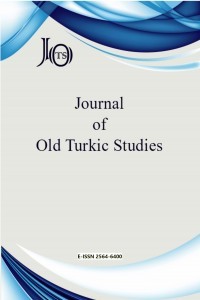Hebrew Etymology for the Ethnonym Kipchak and the Etymologies for Varachan and Turk
Kipchak, hollow tree, Hebrew etymology, Varachan, Turk
Hebrew Etymology for the Ethnonym Kipchak and the Etymologies for Varachan and Turk
Kipchak, hollow tree, Hebrew etymology, Varachan, Turk,
___
- Dunlop, D. M. (1967). The History of the Jewish Khazars. New York: Schocken Books.
- Nurutdinov, F. Kul Gali: Hon Kitaby. Description of Saksin. (http://s155239215.onlinehome.us/turkic/10_History/Djagfar_Tarihi/Volume3/DjagfarTarihiV3P2En.htm pp. 31-58.
- Nurutdinov, F. Kul Gali: Hon Kitaby (Book of Huns). (http://s155239215.onlinehome.us/turkic/10_History/Djagfar_Tarihi/Volume3/DjagfarTarihiV3P1En.htm pp. 16-30.
- Yalvar, C. (2018). The Origin of the Kipchak Turks and Early Historical Periods. Yeditepe Üniversitesi. Sosyal Bilimler Enstitüsü. Tarih Ana Bilim Dalı. İstanbul. [Unpublished Master Thesis]
- Young, R. (1984). Analytical Concordance to the Bible. Virginia: MacDonald Publishing Company, McLean.
- Yayın Aralığı: Yılda 2 Sayı
- Başlangıç: 2017
- Yayıncı: Erdem UÇAR
Mixed Texts and Bilingual Examples from Old Uygur Civil Documents
Eski Uygurca Sosyo-Ekonomik Belgeler Hakkındaki Çalışmaların Kaynakçası
Budist Uygurlarda ‘Ateş Ritüeli’: Homa (Tantrik Türk Budizmi Metinleri Tanıklığında)
Menâkıb-ı Hâcı Bektâş-ı Velî: Hâcı Bektâş-ı Velî’nin Rûm’a Geçişini Beyan Eder [06 Mil Yz A 6732-6]
Hunnic 鐵伐 Tie-ba [< tie’fa ] and Scythian Ταβιτί [Tabıti]
Hebrew Etymology for the Ethnonym Kipchak and the Etymologies for Varachan and Turk
Ümit Özgür DEMİRCİ, Mehmet HAZAR, İbrahim ÖZKAN, Ali KILIÇ
Eski Anadolu Türkçesi Dönemine Ait Bir Eser: Dâsitân-ı Cümcüme Sultân [06 Mil Yz A 9991/2]
